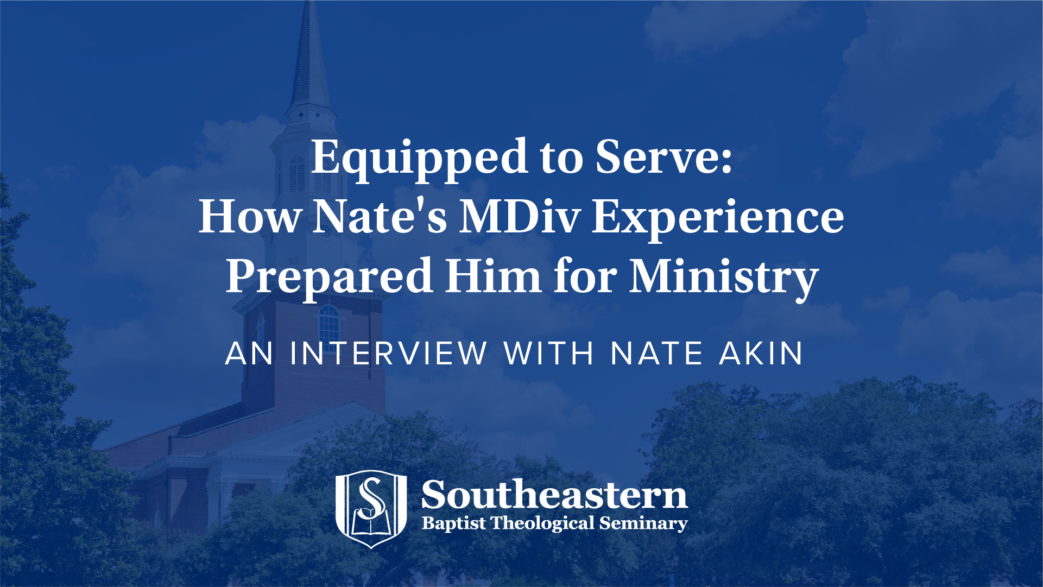Life on mission is a life of service as worship — worship of Christ through service to his Church. For Baptist21’s Executive Director Nate Akin, that is what the MDiv at Southeastern Baptist Theological Seminary enabled him to do and what he saw modeled by his Southeastern professors in the classroom and on the mission field.
Preparing students for a lifetime of faithful service, Southeastern exists to glorify the Lord Jesus Christ by equipping students to serve the Church and fulfill the Great Commission. It is this vision for serving the Church and advancing the mission that still grips Nate’s heart — in large part, because of the training he received at Southeastern in partnership with his local church.
In the following Q&A, Nate shares about his profound spiritual formation and preparation for ministry in Southeastern’s MDiv program:
1. What was uniquely formative — both spiritually and ministerially — about your time in Southeastern’s MDiv program?
I would say two key things: 1) Personal interaction and time with professors and 2) the Equip Network, which not only equipped me at Southeastern but also provided seminary credit for the training I received at Open Door Baptist Church.
I knew I would get good content and be stretched academically at Southeastern, but the time spent with professors in and out of the classroom was the most impactful. As I saw their passion for what they taught and for the local church and the Great Commission, I developed a deep love for church planting all over the world. I remember going on a mission trip to Turkey with Dr. Liederbach and just seeing his humble leadership, prayer, and devotional life. Those are the kinds of memories I won’t forget.
Regarding my experience with the Equip Network, the shepherd’s training I received at Open Door (in conjunction with Southeastern) was truly life-altering. It helped shape my convictions and calling and set the trajectory for what I do to serve our Lord now.
2. How did Southeastern’s Great Commission mission shape your time in the classroom, your relationship with professors and fellow students, and your own involvement in your neighborhood and in your local church while you were a student?
Southeastern’s almost singular focus on the Great Commission was intertwined with every subject matter and every class, which was pivotal for me. I went on five mission trips while studying as an MDiv student — all of those led by Southeastern professors and joined by Southeastern students. These were formative times where what we had learned in the classroom got put into action. It helped connect real faces with the content I was studying in the classroom and connect real experiences with longings I had developed during my time in the Scriptures.
In addition, an evident love for the local church permeated Southeastern’s classrooms. Dr. Hammett’s class on ecclesiology really helped solidify for me that I am indeed a Baptist and that Baptist convictions and distinctives most closely align with the New Testament. So, it shaped in me a love for the local church and a desire to serve.
Initially, I was able to serve as a volunteer college minister, and in time, more opportunities came. However, what was likely of greatest importance during my time at Southeastern was hearing and acknowledging that if I don’t live a life of evangelism and Great Commission service while unpaid, then what makes me think money will change my heart? During my time at Southeastern, I was often reminded to be faithful, available, and teachable (humble). As a young seminarian, comparing myself to those around me and dreaming of vocational positions, this was something I desperately needed to hear.
3. How has your Southeastern MDiv training equipped you for your current ministry?
I now serve the Pillar Network. Pillar believes, and this is not original to us, that the local church is both the goal and means of mission. I have said this in other places, but the King has given the local church “the keys” to his kingdom. Therefore, if we are going to be about his Great Commission, it will involve starting and strengthening kingdom outposts (local churches) everywhere. Southeastern was truly formative for me in developing these convictions.
Although the MDiv was integral to my preparation for life-long ministry, it is worth noting that an MDiv is not a requirement for pastoral qualification. The Scriptures teach one must have the ability to “hold firm to the trustworthy word as taught, so that he may be able to give instruction in sound doctrine and also to rebuke those who contradict it!” Given the unstable cultural ground we are on today, however, more theological education and training is needed, not less! The 30 or so classes I took during my time at Southeastern absolutely trained me to hold firm to sound doctrine and to recognize aberrant theology, not only for my own good but also so that I might bless, build up, and guard those the Lord would place under my care or put around me by way of influence.

